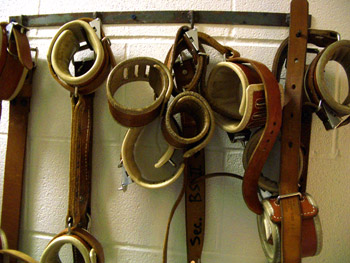“An Environment Which Fosters the Health, Self-Respect and Dignity of the Child”
Tomorrow marks the 20th anniversary of the Convention on the Rights of the Child, the most comprehensive treaty on children’s rights. The convention has been ratified by nearly every country in the world, except for the United States. The convention would fill current gaps in U.S. laws, and provide all children in America with the same robust protections that children in 193 countries are already entitled to.
If you’re on suicide alert when they restrain you, they put a helmet on you. You can’t even breathe out of the helmet and you’re crying out, telling them it hurts and they say, ‘Well we don’t care. Until we get your compliance you’re not gonna get out of the restraint.’ …Some of the staff will get on top of you, even male staff will get on top of you and restrain you, their whole body on top of you.
— Keesha,* a 16-year-old girl incarcerated at the
Ron Jackson State Juvenile Correctional Complex,
a high-security youth prison in central Texas.
Listen to more of Keesha’s and others girls’ interviews >>
Through our investigations of child prisons in Texas, we have found that, as a matter of course, girls who hurt themselves or express suicidal feelings are sent to solitary confinement, girls are subjected to needless invasive strip-searches, and when girls resist strip-searching or are deemed to be acting out, they are subject to physical violence.



Leather restraints used on incarcerated girls.
These abusive practices resemble those in adult prisons, and are utterly inappropriate for children, especially when we consider that many girls who end up in prison were arrested for minor, nonviolent offenses or “status offenses” like truancy or running away from home, and that nearly every one of them has suffered multiple traumas, including sexual abuse, physical abuse, drug addiction, mental illness, poverty, and violence. The system utterly fails to provide these children with treatment and instead re-traumatizes them.
When we incarcerate girls and boys and subject them to the punitive and inhumane treatment that is inevitable in prisons, we are forgetting that children, especially those who have suffered abuse, deserve extra protection and compassion. This is in part because U.S. law does not explicitly recognize an obligation to treat children with any more care or compassion than adults.
By contrast, the international human rights treaty, the Convention on the Rights of the Child (CRC), reminds us that “the child, by reason of his [or her] physical and mental immaturity, needs special safeguards and care;” that “no child shall be subjected to… cruel, inhuman or degrading treatment or punishment;” and that “every child deprived of liberty shall be treated with humanity and respect for the inherent dignity of the human person, and in a manner which takes into account the needs of persons of his or her age.”
In fact, the CRC obligates governments to
“take all appropriate measures to promote physical and psychological recovery and social reintegration of a child victim of any form of neglect, exploitation, or abuse…. Such recovery and reintegration shall take place in an environment which fosters the health, self-respect and dignity of the child.”
Imagine if this were the guiding principle of our juvenile justice system, rather than our current punitive model. Imagine if we treated children caught up in the system as victims of abuse, rather than as criminals, and made real efforts to rehabilitate them, rather than dismissing them as unredeemable and casting them away.
If ratified by the U.S., the Convention on the Rights of the Child would provide a strong foundation for moving toward a more effective juvenile justice system – one that recognizes that the “juveniles” involved are children and that “justice” can only be achieved if rehabilitation is pursued and the underlying trauma that these children have suffered is addressed. It is also critical to note that another major human rights treaty of particular importance to defending the rights of girls, the Convention on the Elimination of All Forms of Discrimination against Women (CEDAW), has also not been ratified by the U.S.
*pseudonym


